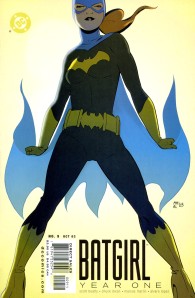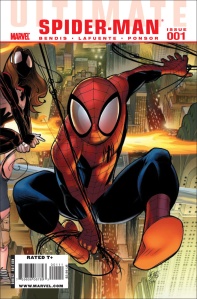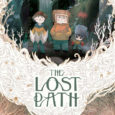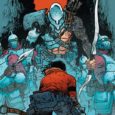You know what they say: every hero has a beginning.
Okay, actually, generally in the case of continuing comics universes? Every hero probably has several beginnings, told over and over again and argued over which is the most accurate.
In the wake of the announced Batman: Arkham Origins game, as well as a discussion over Mark Waid’s Superman: Birthright for the Canvas Network’s Comics and Gender class this past week, I was forced to take a long look at myself and make a choice. And important choice, true believers.
I was forced to finally admit that I am not a fan of retellings of superhero origins.
Before we get too in-depth here, lemme go over a few things. First of all, I  know that there are plenty of good reasons to retell a character’s origin and I’m not saying it should never be done. Updating an origin story can be a great way to draw in new readers or just to help smooth out timeline issues for characters who have been around for 80 years. The world has changed hugely since most major heroes hit the scene, so updated versions of origins make total sense.
know that there are plenty of good reasons to retell a character’s origin and I’m not saying it should never be done. Updating an origin story can be a great way to draw in new readers or just to help smooth out timeline issues for characters who have been around for 80 years. The world has changed hugely since most major heroes hit the scene, so updated versions of origins make total sense.
Secondly, I’m not talking about retelling origins in film and television versions of heroes. With both of these scenarios, you’re dealing with a different medium and, with movies especially, very limited time to tell a story. So if Hal Jordan’s origin story as Green Lantern has to be simplified a bit in order to fit screen time, it’s understandable, and I hope they’ll keep that in mind should they ever make an actual Green Lantern movie.
Thirdly, I’m not saying my opinions here are the end-all-be-all, these are purely my own observations and thoughts. But some of these things bug me to the point that I need to bring them up, rant about them, and then move on with my life. So it’s all good.
Ready? Okay, so, here are what I like to call The Four Cardinal Sins of Retelling Superhero Origins. It’s not a catchy name, I know, I’m working on it.
SIN #1: Change Everything Or Change Nothing
To be fair, this is a “damned if you do, damned if you don’t” situation and is a big part of why I’m generally not a fan of these sorts of things. But basically, when you revisit an origin you can keep everything the same or you can change major parts of the origin…and no matter what you can’t satisfy people.
In the first situation, you retell a very faithful version of a hero’s origin. Which seems safe: this is how it happened, this is how it has always happened, this is how it will continue to happen forever and ever until the collapse of the Multiverse (AGAIN). Problem is, you’re going to get hammered from people who wonder why you bothered. Why retell this story if it’s the same thing, why don’t you just have people read the original version of the origin story? If you’re not going to add anything, haven’t you just wasted fans’ time? (No, you haven’t, but that’s not the point here).
So, in the second situation, you make changes. Say, you take Diana of Themyscira and, rather than having her molded out of clay and brought to life by the Gods, it turns out her mom “got jiggy” with Zeus and Diana was the result. Also, Amazonian eugenics, WOOOOO! And, hey, you think, you’ve taken the character in a new direction!
Yeah, you’ll get people like me calling for your fucking head because that origin doesn’t really seem to mesh with our feelings on the character and SERIOUSLY, OKAY, WHAT THE HELL IS WRONG WITH YOU?
Is this overreacting? Yes, it is (NO IT ISN’T YOU FUCKED WITH WONDER WOMAN YOU FUCKERS). But the point is, you are screwed no matter what you do with an origin. Like it or not.
SIN #2: HEY, DID YOU GUYS NOTICE THIS IS A PREQUEL?!?!
Okay, this is listed as Sin #2 but is legitimately my pet peeve with superhero origins. We know that this is being written after years and years and years of the hero being in action and stuff will happen that will change them and alter their lives and The Universe Will Never Be the Same (TM).
So we the readers know that. But odds are, the character themselves, narrating in the present time, doesn’t. So, when you add in those cute little “shout outs” to future events, you are making things suck.
 My favorite example of this is Batgirl: Year One. Throughout the series, Barbara Gordon, in her first year as Batgirl, makes several references to Cassandra, a figure in Greek Mythology who could foresee the future and was cursed with nobody believing her. There’s other mentions of seeing the future as well.
My favorite example of this is Batgirl: Year One. Throughout the series, Barbara Gordon, in her first year as Batgirl, makes several references to Cassandra, a figure in Greek Mythology who could foresee the future and was cursed with nobody believing her. There’s other mentions of seeing the future as well.
You know, LIKE AN ORACLE WOULD?
It’s like the entire Batgirl: Year One is set-up to remind us that eventually Barbara will be shot, crippled and reinvent herself as Oracle. Which I’m OKAY with, because Oracle is awesome and I wish she were still around in the DCU. But as awesome as I think she is, the narration in B:YO was far too aware of that future, and since Barbara was the narrator, well, it just gets obnoxious. WE know you’re going to be Oracle. You don’t. Because if you somehow DID and yet didn’t use these new precognitive abilities to foresee The Joker showing up at your door and shooting you in the spine, then you have wasted them OR you are asking me to assume you LET THE JOKER SHOOT YOU.
Point being: unless you want me to start thinking about a Alternate Universe where Babs did see The Joker coming, killed him in order to protect herself and James Gordon, and then ended up at odds with Batman over it, don’t tease us with “TEE-HEE, THIS HAPPENS IN THE FUTURE!!!!!” It gets old, it gets distracting and it’s not as cute as you think it is.
SIN #3: Who the Hell Are You Writing This For?
This ties in with #1 and #2, but it’s an important question: when you rewrite a character’s origins, are you rewriting them for established fans or are you doing so to draw in new fans?
Because obviously it’s going to change how you approach it. Depending on the intended audience, the way you establish the character and explore the effects of their power source, childhood, etc. is going to be significantly different, I would assume.
I feel like this is slightly less problematic in something like the Ultimate Marvel  Universe where you’re updating and changing things, but you’ve established that this is a new, different series meant to be friendly for newer readers but fun for established fans. Of course, then you run into the problem of letting Mark Millar touch that project, but that’s another rant ENTIRELY.
Universe where you’re updating and changing things, but you’ve established that this is a new, different series meant to be friendly for newer readers but fun for established fans. Of course, then you run into the problem of letting Mark Millar touch that project, but that’s another rant ENTIRELY.
But with something like The New 52 or other stand alone origin retellings, you are possibly completely reinventing the timeline supposedly for new readers, but trying so hard to appease established fans at the same time that it just falls flat. What has or hasn’t happened in that time line, is it a complete reboot or are we accepting that things were the same until x point in time? Why is x point in time the point in time where everything altered? And why are we dealing with this when we’re just headed for #4 anyway?
SIN #4: Don’t Get Used To It
You changed that character’s origin? That’s neat!
I’m just gonna stand over here until someone else changes it again.
Look, it’s the sort of thing I’m rolling my eyes over with the New 52 Reboot: in about five years, someone’s suddenly going to go WAIT, NONE OF THIS EVER HAPPENED, THE NEW 52 WAS JUST A DREAM FLASH HAD AFTER FLASHPOINT! and everything gets mangled again. It’s hard to really buy any new origins when you know that at some point in the future you’re just getting a NEW new origin or a NEW old origin or…you get the idea.
Like I said, these are my personal gripes with new origin stories, and I don’t think ALL of them fall into these traps. I don’t think it should stop anyone from enjoying what they enjoy. Writing for the internet comes with great power and great responsibility and I’m not trying to abuse the first or ignore the second.
At least, not in this incarnation. Talk to me after they rewrite my origin and it might all be a different story.
Ashly is an IHO Geek staff writer who gained her inhuman blogging powers after being bitten by a radioactive Cory Doctrow. You can follow her on Twitter @newageamazon.
















Rule #1 of redoing an origin: Never let John Byrne write it (See Spider-Man:Chapter One)
I think this is less of a problem with DC than Marvel in the sense that DC seems to remake their universe every generation – so may as well take the opportunity to change the origin – even if it’s just minor details.
While I prefer Marvel’s rolling continuity – their lack of letting the characters age has weird stuff like Spidey dressing like a 1960s character in flashbacks to his origins because it was the 1960s in real life.
So I guess that goes to show another one of those damned if you do damned if you don’t things. Perhaps it’s why I’m getting more into comics with a definite end like Y: The Last Man or Chew.
Anyway, enjoying your insights in the class and glad it led me to this site.